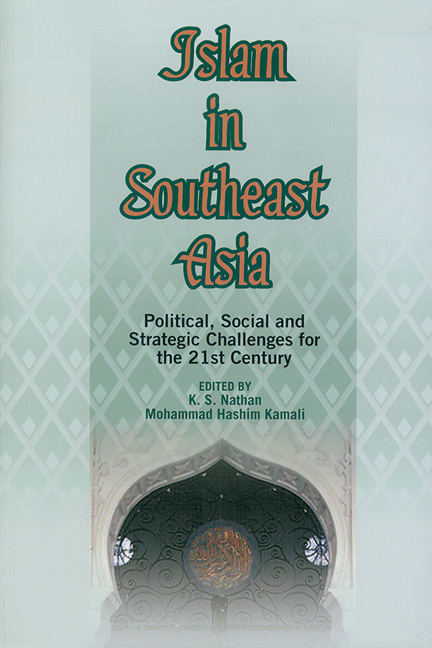Book contents
- Frontmatter
- Contents
- Preface
- Introduction: Understanding Political Islam Post-September 11
- PART ONE ISLAMIC DOCTRINE, HISTORY, GROWTH AND INSTITUTIONS IN SOUTHEAST ASIA
- PART TWO POLITICS, GOVERNANCE, CIVIL SOCIETY AND GENDER ISSUES IN SOUTHEAST ASIAN ISLAM
- 6 Islam Embedded: ‘Moderate’ Political Islam and Governance in the Malay World
- 7 Law-Making in the Name of Islam: Implications for Democratic Governance
- 8 Is It Always Islam versus Civil Society?
- 9 Islamization, Civil Society and Religious Minorities in Malaysia
- 10 Islam and Gender: Reading Equality and Patriarchy
- PART THREE MODERNIZATION, GLOBALIZATION AND THE ‘ISLAMIC STATE’ DEBATE IN SOUTHEAST ASIA
- PART FOUR IMPACT OF SEPTEMBER 11 ON ISLAMIC THOUGHT AND PRACTICE
- CONCLUSION: Addressing the Challenge of Political Islam in Southeast Asia
- Note on Contributors
- About the Editors
- Index
8 - Is It Always Islam versus Civil Society?
from PART TWO - POLITICS, GOVERNANCE, CIVIL SOCIETY AND GENDER ISSUES IN SOUTHEAST ASIAN ISLAM
Published online by Cambridge University Press: 03 November 2017
- Frontmatter
- Contents
- Preface
- Introduction: Understanding Political Islam Post-September 11
- PART ONE ISLAMIC DOCTRINE, HISTORY, GROWTH AND INSTITUTIONS IN SOUTHEAST ASIA
- PART TWO POLITICS, GOVERNANCE, CIVIL SOCIETY AND GENDER ISSUES IN SOUTHEAST ASIAN ISLAM
- 6 Islam Embedded: ‘Moderate’ Political Islam and Governance in the Malay World
- 7 Law-Making in the Name of Islam: Implications for Democratic Governance
- 8 Is It Always Islam versus Civil Society?
- 9 Islamization, Civil Society and Religious Minorities in Malaysia
- 10 Islam and Gender: Reading Equality and Patriarchy
- PART THREE MODERNIZATION, GLOBALIZATION AND THE ‘ISLAMIC STATE’ DEBATE IN SOUTHEAST ASIA
- PART FOUR IMPACT OF SEPTEMBER 11 ON ISLAMIC THOUGHT AND PRACTICE
- CONCLUSION: Addressing the Challenge of Political Islam in Southeast Asia
- Note on Contributors
- About the Editors
- Index
Summary
INTRODUCTION
This chapter will explore the issue of whether Islam — especially the agendas of political Islam — is antithetical to the democracy that defines a Civil Society. Among the many vital aspects one could explore in terms of civil society and Islam, I am choosing to address a core element of concern in Southeast Asia: are civil society and Islam antithetical to each other? This concern is about relatively new states and democracies — especially those with Muslim majorities — which are either appropriating, struggling against or juggling Islamists, political Islam and a fidelity to being Muslim countries, together with being configured as democratic, modern nation-states with heterogeneous populations. Among the questions raised by those who live with Islam and modernity, especially the nation-state, are: how can the universalism of Islam be reconciled with the reality of the nation-state, the embodiment of difference and pluralism beyond Islam encapsulated within national boundaries? Are the defining elements of a nation, premised on fundamental freedoms and an individual's rights, resonant with a theocracy and/or the objectives of political Islam which are often to establish an Islamic legal and social order defined by the shari'a? This chapter deals with aspects of these questions, exploring whether the democracy inherent in the notion of civil society is cohesive with Islam, especially political Islam. These questions are especially acute in the context of the calls for and declarations about an Islamic state in Malaysia and to a lesser extent, Indonesia; as well as the plan by Jemaah Islamiyya militants to forge a dawla islamiyya or Islamic nation in nusantara or Southeast Asia. The chapter explores what has been articulated theoretically about Islam and civil Society in both the Middle East and in Southeast Asia, while offering some reflections on a specific example, Malaysia.
I am using the term “political Islam” to indicate a defining element of groups who proclaim an Islamic agenda — such as the primacy of the shari'a or the implementation of an Islamic state — to achieve power through political participation and democratically-constituted elections. As such, the coherence of “political Islam” is with groups that are essentially fundamentalistoriented, applying text and historical tradition literally to evolve a polity for the present.
- Type
- Chapter
- Information
- Islam in Southeast AsiaPolitical, Social and Strategic Challenges for the 21st Century, pp. 135 - 161Publisher: ISEAS–Yusof Ishak InstitutePrint publication year: 2005

